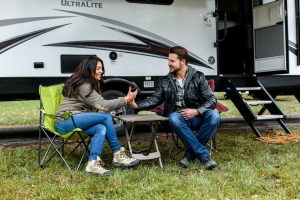10 Suggestions For the New RV Owner …
If you’re thinking about purchasing a recreational vehicle – Here we come, Grand Canyon! — we have some helpful suggestions for you.
From tiny trailers to over-the-top luxury motorhomes, a recreational vehicle, often abbreviated as RV, is a motor vehicle or trailer. They typically include living quarters designed for accommodation. Some types of RVs include motorhomes, campervans, caravans, fifth-wheel trailers, popup campers, and truck campers.
- The first thing you should pack is what you MUST HAVE: The tools to maintain your recreational vehicle. You can Google great starter tools, but we say you should start with a four way wrench and a wrench set to make sure you have every bolt covered on your vehicle. And duct tape.
- Make sure you have the proper insurance before taking your RV out on the road. Seriously. Talk to your agent. There are so many facets to insuring your camper – contents, awning, glass, the list goes on – and you need to know that you are properly covered.
- Tires, Tires, Tires. When at the dealership or with the private seller, check the date on the tires; the tires could be used even on a new camper. And make sure the weight of your recreational vehicle matches the tire load capacity. Get a digital tire gauge which allows you to track the pressure from your cab. If your trailer doesn’t come with a spare tire or mount, get one. Finally and always … maintain your tires.
- Know Your Measurements. When you’re on the road, be very attentive when it comes to the height clearance of your recreational vehicle. It’s not a bad idea to keep the height of your RV posted inside the cab for quick reference. As far as the length of the rig, the measurement is posted next to the door, but that number doesn’t include anything you might have hitched on to the back, so keep that in mind. We were out of luck at a campsite once when we said our camper was 28’ but we didn’t take into account the hitch and the bicycle rack on the back.
- Know your tanks. You will need to figure out how much your fresh, gray, and black tanks hold. Seriously. Know this.
- Stay closer to home the first few time you go out. There will be time for epic RV trips later. The first few trips? You will be missing items, dealing with glitches, and figuring out a rhythm. Plus you need to gain confidence towing and learning how to operate your new rig. Additionally, it wouldn’t hurt to reserve a pull-thru site at your first campground.
- Don’t be afraid to decline help when backing in to a site. Veteran RV owners are notoriously and freakishly friendly and helpful people when they see people trying to back into a site. This can be annoying in your rookie days. You need to figure it out. Make a joke and kindly explain that you need to learn, even if you are there all night. Veterans will get your position.
- * This is more important than it seems!* Keep a pad of paper handy in a central location in the RV where anyone can jot down things that you need to bring-pack-buy-find-do-fix for the next trip. We are in our fifth year of camping and we still find a need to jot things down.
- Join some Facebook camping groups and ask questions. Learn.
- Be kind to – and respectful of – your camping neighbors. You never know when you are going to need to borrow a hose to get water to your camper or when you will need help securing a canopy when a torrential downpour comes. One time we were at a campsite when the family across from us started driving away in their Class C camper, abandoning all of the items on their site – chairs, towels, games, grill. As they drove away, the father yelled to us, “We have to take our daughter to the hospital. Can you watch our stuff?” And we watched his stuff like campfire-sitting hawks. Generally, RV neighbors are willing to help, so cultivate those short-term relationships.
Need to insure your new home on wheels? Call us. We know exactly what to do.



